Dennis Quaid is everything you ever imagine him to be and more. Sitting down with him again, this time to talk about his new film I CAN ONLY IMAGINE, is a joy. As affable as ever with that killer smile and a twinkle in his eye, he’s more concerned about my comfort than his, acting as the perfect host, moving tables for recording equipment, offering beverages. Running on a non-stop schedule with promotion, performing, and filming, his energy seems boundless making him somewhat of a rarity for, as he puts it “I just go where they point ‘cause I’ve already said yes [by doing the film].” His generosity of time and spirit never falters which makes I CAN ONLY IMAGINE a perfect vehicle for him at this juncture of his life.
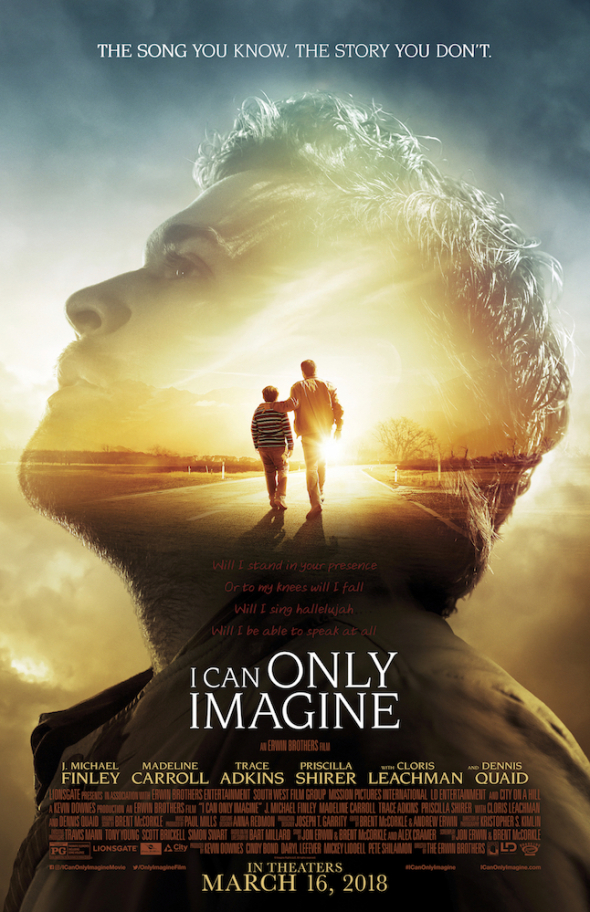
I CAN ONLY IMAGINE is the story of Christian rock band Mercy Me frontman, Bart Millard, and specifically, his story that led to the writing of the song “I Can Only Imagine”, the biggest selling Christian song of all-time and one that crossed over to be a hit in mainstream music as well. Directed by brothers Jon and Andy Erwin with script by Jon Erwin and Brent McCorkle, I CAN ONLY IMAGINE stars Broadway’s J. Michael Finley who makes his film debut as Bart Millard while Madeline Carroll play’s girlfriend Shannon, Cloris Leachman shows up as Bart’s grandmother Memaw, and Trace Adkins is fittingly cast as a music producer. But it’s Dennis Quaid who packs the most punch as Millard’s troubled, violent, and abusive father, Arthur. The story is as much about Arthur’s demons and his journey to redemption and forgiveness as it is Bart’s running from the physical and psychological abuse of his father before finding his way back to reconciliation and forgiveness. This is a Dennis Quaid we have never seen before on screen, but it’s one that you relish with every word, every look, every movement, every nuance, as Arthur finds God, salvation and peace.
In this exclusive interview, DENNIS QUAID talks about the experience of making I CAN ONLY IMAGINE and how it became a renewal of faith for him.
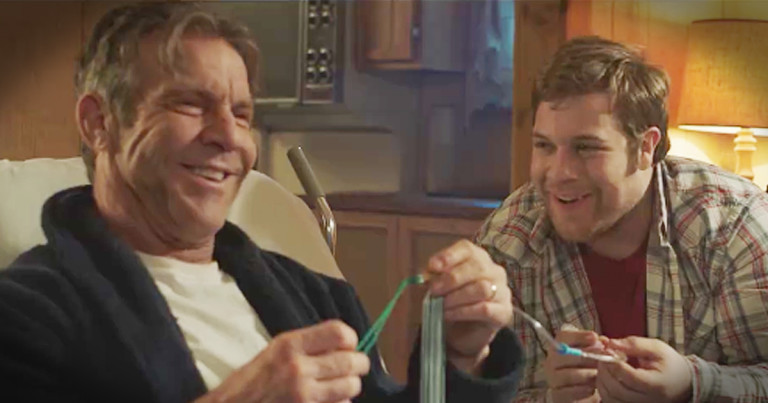
Dennis, something I’m glad you said yes to was this film.
Yeah, me too.
Your arc, the arc of Arthur. To see you with such a redemptive character. And to see you play it. It’s beautiful to see on the screen.
Well, that’s what happened to this person, this real person too. It’s a story of how the impossible made it possible, and that arc of something, of change in one’s life, real change.
I’ve got to say this, but to watch them really dirty you up and age you up at the beginning of the film, you looked older than Cloris [Leachman]!
[heartily laughing] Well, thank you very much, I think!
But by the end of the film, there was the Dennis Quaid we all know and love.
Even though [Arthur] was dying at the end. Yeah, it was great. In my very first movie, I don’t say movie, my very first job ever in this town, I got a week after I got here. Jonathon Demme was a friend of my brother’s and he was doing something. We went down to that set and Cloris Leachman was the lead in it. It was called “Crazy Momma.” And Donny Most, I think, was in it. And I remember seeing her on the set. Of course, I knew her from “Mary Tyler Moore” and all that stuff as a kid growing up, and she’s the same age as my mother. But I wound up getting a job as the bellhop at the hotel that they were checking into. And they pulled out guns and robbed the hotel and I had a line, “Oh my God, don’t shoot me!” They cut the line. It was really an extra job. But that got me my SAG card transferred from Texas to California. So thank you Jonathan Demme and Cloris Leachman! And then [here] she’s playing my mom! We had a couple of scenes there together. And she is so there man! 91 and kicking it. I mean kicking it down!

I always love seeing Cloris. We’ve done quite a few interviews together. And I know many directors who have worked with her and they’ll go, “It’s easier to herd cats than Cloris.”
Yeah. [laughing] But she’s so for real. Oh, she’d just let off on me. We’d improvise. Working with her was so real. It’s this reality thing with her. They’d say, “Cut,” and she says something that Cloris Leachman says that just cracks you up. You can’t believe that somebody actually said that, which is great with me because I love it no matter how heavy the situation. In fact, I think it helps the situation when you say, “Cut,” that you won’t get completely away from it, especially something like this, emotionally and everything, and just drop it and come back to it. That’s the way it works for me at least.
And how was this experience with working with J. Michael Finley?
He’s an incredible guy, very vulnerable, humble guy, incredible talent. Great singer himself and we were just right there with each other, man. We looked out for each other.
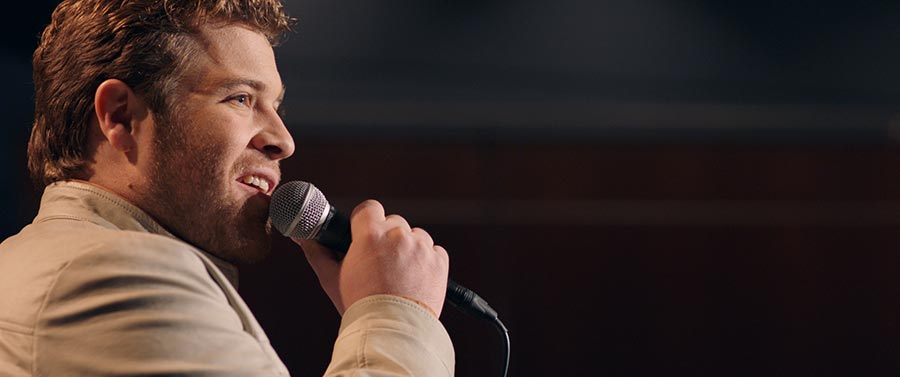
I’m curious, Dennis. You’ve played so many real-life characters. Men and people who are very much alive. Jimmy Morris for one, still one of my favorite performances is Jimmy Morris.
Oh, thanks. I just saw him last year. He’s a great guy.
But you tackle these characters. And there aren’t too many actors who are brave enough to tackle the “real” human beings.
Oh, I don’t know about that. I think they all want the role. They want a job for sure, but, go ahead, what were you going to say?
You have a great ability to tap into the humanity and the actual heart of each of these real men that you play.
That’s what fascinates me about acting. It’s really why I wanted to become an actor because I’m fascinated by what makes people tick. Why they are they the way that they are, when they say the things they say and do, who you love. What they do has an impact on who they are. What kind of childhood they had, why do they walk that way. What makes them think that way. And the combination of factors. So when you play a real person I try to be true to them. I try to not comment on it or judge them. I just try to get inside their heads about how the way they feel about themselves inside.
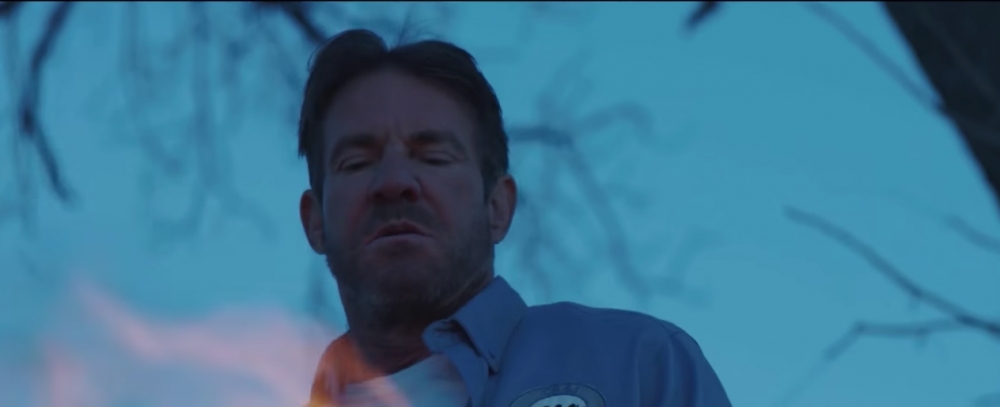
Now did you get a chance to speak with Bart [Millard] about his father?
I sat him down when we first got to the shooting. Of course, I read the script and the script was, I couldn’t believe the story.
You didn’t know the story going in?
I didn’t know the song. I didn’t know the story. I didn’t know the CD, anything.
You’re a musician and you didn’t know the song? Wow!
No, I didn’t know it. And “I Can Only Imagine”, which he wrote about his father after he died, became the biggest faith-based song ever, and it’s picked up. People when they hear it, that’s the reason it’s so big, because everybody relates to it personally in their own lives. That’s what hits. But I didn’t know anything. So, I took the CD and the script. I put the CD aside. I’m just going to read the script [as] that’s what I’m doing. And it hit me in such a profound way what Bart had been through in his childhood and well into his teens as a young man. And how his father could do this to his son. Even if he was an abused child himself, or he was a bitter man about his own dreams that weren’t fulfilled, that’s no excuse for abuse. But he made Bart feel bad about himself every day. The self-esteem on that! His father got cancer and Bart was well into his teens. He had left home. He left home early. You call it run away or just get out, or whatever, you know, out of fear. His relationship with his father was dead. And there was something about Bart that was dead inside too. But his father got cancer and it was the death sentence type of a cancer, and he didn’t tell anybody about it. He was too tough for all that stuff. But it started something in him. He had to face himself. He was facing death. You go to sleep at night and when you wake up, you’re facing it. And he had a spiritual awakening through that. You can call it a death row conversion.

I like that.
You can call it that, but however it happened, it was real. And he started to see himself for who he was and had been. And he was this, as Bart describe him, a monster. I mean a real true monster, physical, emotional and verbal abuse. Epitaph through spiritual awakening and through prayer, and in his path, he found Jesus. Prayer makes us really see the truth in ourselves. And he had to face that. And Bart was long gone. Bart did not even know he had cancer because he didn’t tell anybody. [Reconciliation] wasn’t going to happen. And his father persisted, really seeking forgiveness, real forgiveness, ’cause he’d never asked anything from anybody. And slowly he came about. And Arthur also had to forgive himself too. And they wound up, in increments at a time, getting closer and closer. By the time Arthur died they had the most loving close relationship, father and son, which was a fantastic gift they could give Bart, ’cause Bart did not have to carry that feeling about himself and about his father around for the rest of his life. It would have been the rest of his life. And when Arthur died, Bart wrote “I Can Only Imagine”, the song, which became the biggest selling faith-based song.
And it crossed over into everything. I heard it on pop stations.
Yeah. Right. It was. And you know why? He wrote it about his father and it was picked up in a faith-based community. It’s about Jesus, which it is and then it’s not, but it could be. It relates to everybody because it’s personal to everyone. Everyone makes it personal unto themselves. Everyone has something in their lives that hole, the this, the that, that you get filled. It’s a song of hope and redemption, and it’s a song of joy. And it’s beautiful.
It is. How did the song help influence you listening to it for this role?
Like I said, I never heard the song before. It actually kind of worked on me slowly, to tell you the truth. And last night, in fact last night I was in Dallas. I was on stage with Bart, and at end scene of the movie where he’s out in the audience, it was like that. I’d come over there and I’d do a song with him, and he does this other thing, it was like the end of the movie again. And it’s a beautiful song. And I think they’ll be singing it a 100 years from now.
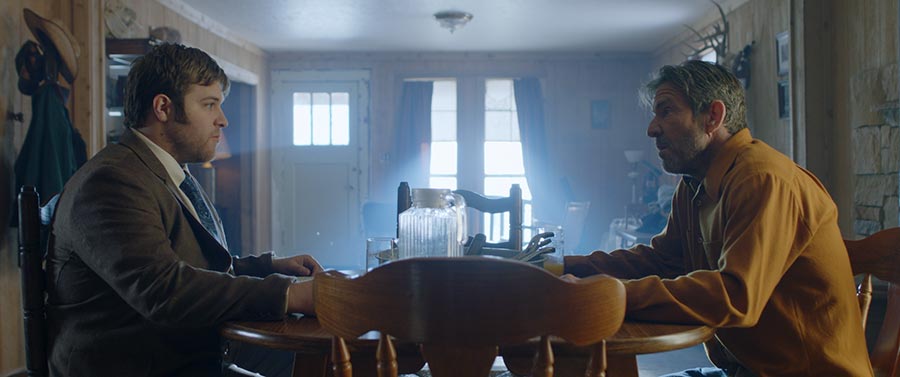
Absolutely. You’ve done father and son portrayals before, but what did you take away from this performance, Dennis, that you’ll take with you in your life or into future work? Because this redemptive arc, this character of Arthur, is something we haven’t seen before. It’s a new experience watching you in that role. So I’m curious what you’re now going to take from this?
You know, I don’t know if I can answer that in full. I know that while I was doing it, I’m sure I took away some things from that. One thing I know, Andy and Jon [Erwin] had so much to do with this. And so did J. Michael [Finley] being in there. It’s a renewal of faith for me. Not just as an actor but as a person in life. About the impossible made possible. It’s like God will make a way for you, if you ask. But you have to walk through the fire and do the things that you do along the road to do that. And it’s hard. Forgiveness is not easy, and especially forgiving yourself. There’s the big thing.
by debbie lynn elias, interview 02/25/2018












